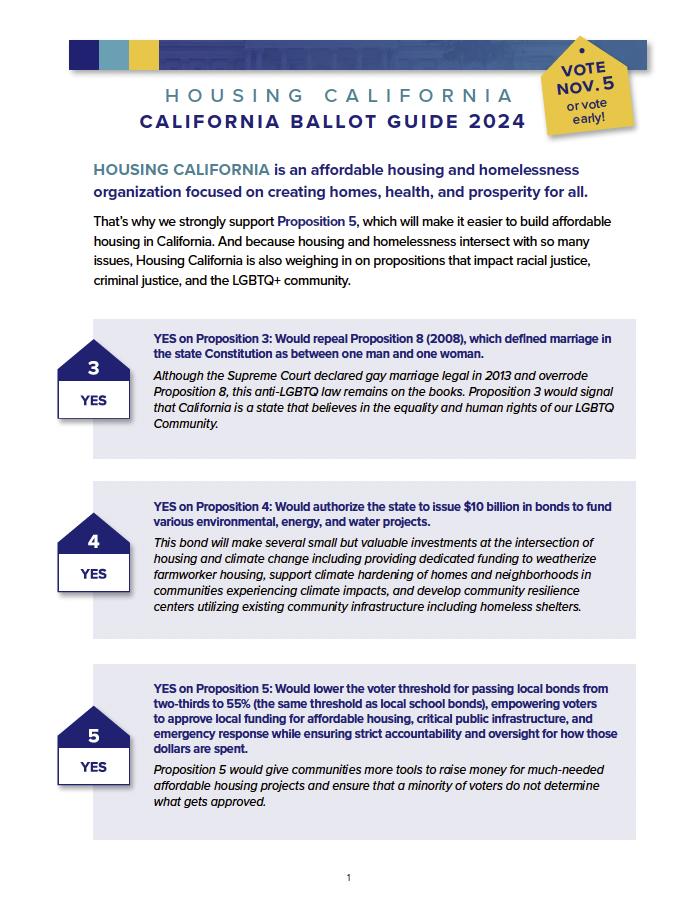California Ballot Guide 2024
Vote Nov. 5 or vote early!
Housing California is an affordable housing and homelessness organization focused on creating homes, health, and prosperity for all.
That’s why we strongly support Proposition 5, which will make it easier to build affordable housing in California. And because housing and homelessness intersect with so many issues, Housing California is also weighing in on propositions that impact racial justice, criminal justice, and the LGBTQ+ community.

3
yes
YES on Proposition 3: Would repeal Proposition 8 (2008), which defined marriage in the state Constitution as between one man and one woman.
Although the Supreme Court declared gay marriage legal in 2013 and overrode Proposition 8, this anti-LGBTQ law remains on the books. Proposition 3 would signal that California is a state that believes in the equality and human rights of our LGBTQ Community.
4
yes
YES on Proposition 4: Would authorize the state to issue $10 billion in bonds to fund various environmental, energy, and water projects.
This bond will make several small but valuable investments at the intersection of housing and climate change including providing dedicated funding to weatherize farmworker housing, support climate hardening of homes and neighborhoods in communities experiencing climate impacts, and develop community resilience centers utilizing existing community infrastructure including homeless shelters.
5
yes
YES on Proposition 5: Would lower the voter threshold for passing local bonds from two-thirds to 55% (the same threshold as local school bonds), empowering voters to approve local funding for affordable housing, critical public infrastructure, and emergency response while ensuring strict accountability and oversight for how those dollars are spent.
Proposition 5 would give communities more tools to raise money for much-needed affordable housing projects and ensure that a minority of voters do not determine what gets approved.
6
yes
YES on Proposition 6: Would change the state Constitution to ban involuntary servitude (forced work) as a punishment for crime. It would also ban state prisons from disciplining people who refuse to work and authorize California Department of Corrections and Rehabilitation (CDCR) to award credits to incarcerated persons who voluntarily participate in work assignments.
California’s Constitution mirrors the 13th Amendment of the U.S. Constitution, which ended slavery but allowed involuntary servitude as a punishment for crime. This racist provision allowed the criminal justice system to become a primary means of continuing involuntary servitude in the late 19th and early 20th centuries. Repealing this relic of slavery from our Constitution will help ensure that our Constitution reflects our values and ensure that those who are differently-abled or do not want to work cannot be disciplined or forced to do so.
32
yes
YES on Proposition 32: Would raise the minimum wage to $17 an hour for the remainder of 2024, and $18 an hour starting in January 2025 – a bump from the current $16 an hour.
This minimum wage increase is necessary given the exponential rise in cost of living in California. Wages have not kept with the rents, leaving low-income people behind. This will be an important step in bringing wages closer to what is needed to afford average rent. While $18 an hour is not enough to afford rising rents in most areas, it is a step in the right direction.
33
yes
YES on Proposition 33: Would repeal the 1995 Costa-Hawkins Rental Housing Act, which exempts single-family and newer residential rental units from rent control ordinances and allows landlords to reset the cost of rent on rent-controlled rental units when they become vacant. Proposition 33 would also prohibit the state from taking future actions to limit local rent control. The proposition itself does not make any changes to existing local rent control laws.
Rent control laws increase stability for low income renters without significantly impacting the income of landlords or disincentivizing new residential development.
36
no
NO on Proposition 36: Would increase penalties for certain drug crimes by increasing sentence lengths and increasing the level of crime from a misdemeanor to felony.
This initiative rolls back the progress we made on Proposition 47 (2014) that reduced certain drug and theft crimes to misdemeanors. This initiative will increase our prison and jail population, disproportionately affect the Black, Indigenous, and People of Color community, and could ultimately result in an increase in California’s unhoused population, since more than 30% of people who are/were homeless have been incarcerated. Proposition 36 would likely cost the state hundreds of millions of dollars annually, which could lead to a decrease in mental health and substance use services to offset these costs.

Share this!

